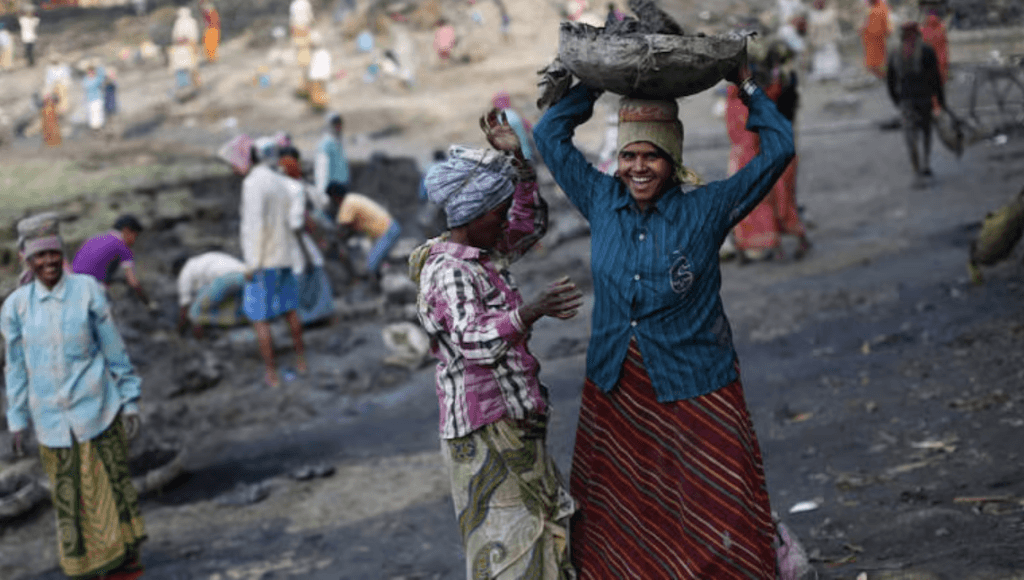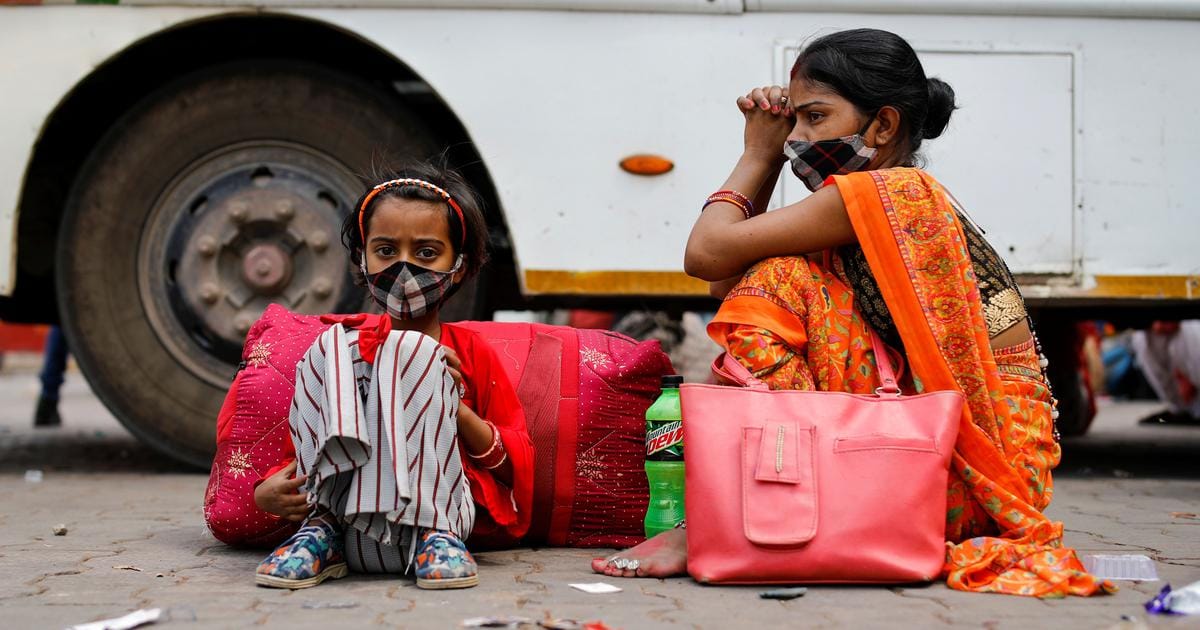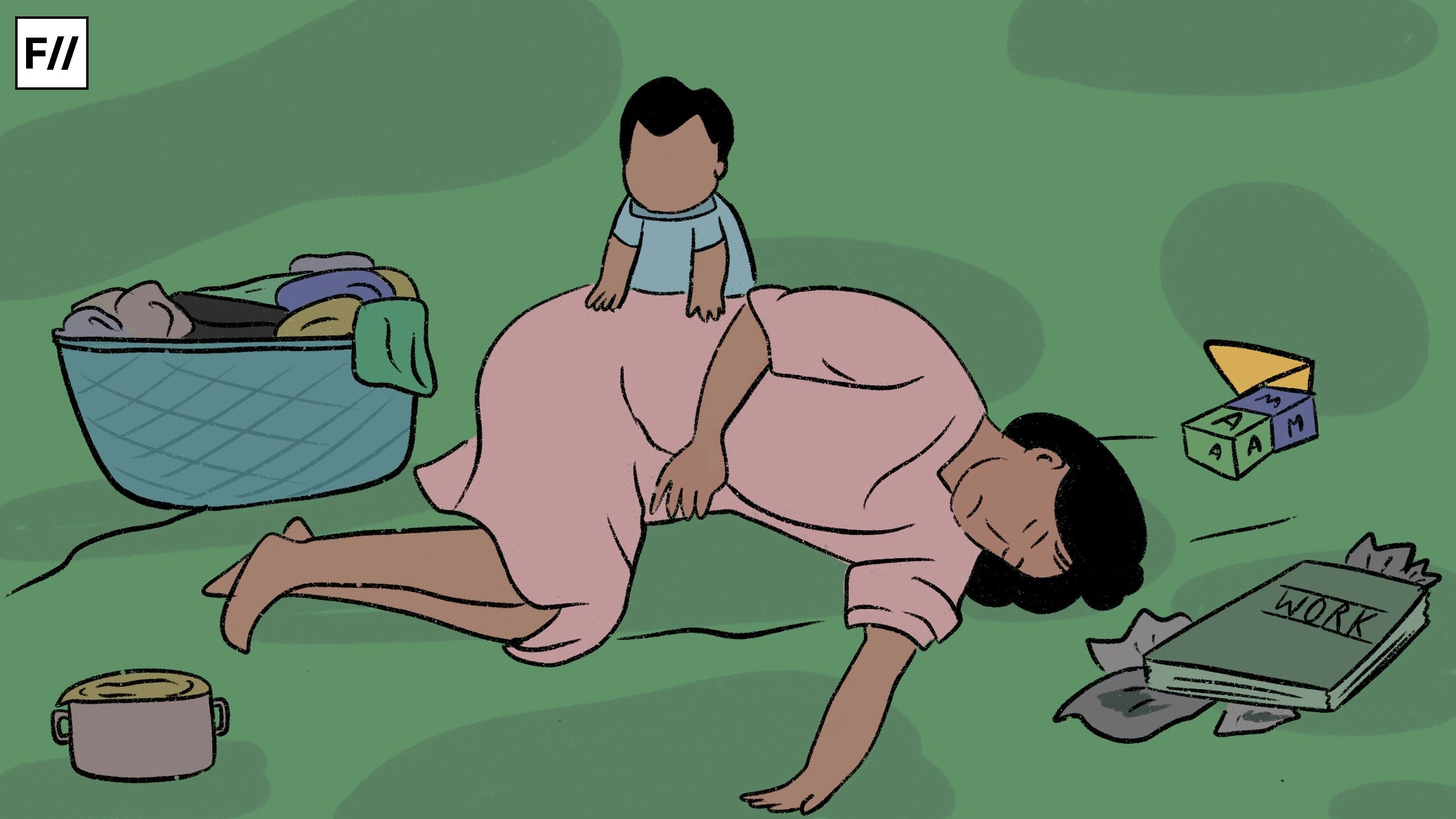In India, internal migration has been a key mode of survival for a large section of the workforce. Migration studies tend to focus on understanding migration as only motivated by economic opportunities — and thus fail to truly comprehend the various social and cultural values that propagate migration. Nowhere is this flaw clearer than with the case of migrant mothers, whose reasons for migration are rarely economic and whose experiences remain undocumented.
Female migrant mothers encounter a work experience shaped by gendered roles and expectations, markedly different from that of male migrants. They juggle informal, low-paid labour with caregiving responsibilities, often without recognition, protection, or institutional support—making their struggles doubly invisible in both policy and public discourse. The invisibilisation of their maternal roles reinforces the idea that motherhood and labour are incompatible. Migrant female mothers also face the ‘motherhood,’ penalty – where their perceived or actual caregiving responsibilities lead to fewer job opportunities, lower wages, and greater instability.
Gendered patterns of mobility and care
According to the 2011 Census, of the 309 million migrants, 218 million are female, whereas the number stands at 91 million for males. Thus, where migrant males constitute 18 per cent of the population, female migrants constitute a staggering 45 per cent. While these numbers may seem to suggest that women are more mobile, they in fact reflect the deep entrenchment of patrilocal norms—where women are expected to relocate to their husband’s home after marriage.

Marriage remains the dominant reason cited for female migration, rendering their mobility social rather than economic. These women are not only workers—they are also mothers. Research has shown that gendered caretaking responsibilities significantly restrict women’s ability to migrate freely, as they are expected to adhere to caregiving ‘maternal,’ roles—be it for their children, the elderly, or other dependents. They treat this unpaid, invisible labour as an extension of their identity, which limits their ability to pursue work opportunities away from home.
Even when women do migrate, especially as mothers, they are not freed from these expectations; rather, they carry them into new and often more precarious contexts. These women are faced with a choice that rarely weighs on their male counterparts: to leave their children behind in the care of extended family or to take them to unknown urban areas. Both decisions come with significant emotional and economic costs. Leaving children behind results in “split families” where women must manage their motherhood through distant phone calls and infrequent visits.
Moreover, children who are left behind face emotional strain and neglect and a higher risk of exploitation by community members. Taking children along, however, is an equally complex situation that requires women to navigate unstable housing, education, and limited access to safe childcare environments— burdens that fall disproportionately on mothers. Fathers are rarely seen to bear responsibility in these situations, with caregiving still viewed as an inherently maternal duty rather than a shared parental role.
Who is a good mother?
Both situations expect the migrant mother to uphold the ideals of selfless, nurturing motherhood, despite structurally denying her the necessary conditions. The dominant narrative of the ‘good mother,’ assumes that childbearing is the woman’s duty, rooted in sacrifice and emotional labour. Even when migrant mothers are pushed into low-income jobs far away from their homes and without stable support systems, they are expected to fulfil their caring roles. Such a contradiction places migrant mothers in an impossible situation: they must economically provide for their families while simultaneously being judged for failing to meet idealised standards of motherhood. The emotional toll of leaving behind children—or bringing them into unsafe environments—is rarely acknowledged in policy discourse.

Rather than the structural constraints that shape their choices, patriarchal ideals measure their maternal worth. This tension calls into question dominant cultural narratives of the “good mother” and opens space for a feminist reimagining—one that recognises motherhood as labour, shaped by migration, class, caste, and government policy. States also often impose normative ideals of motherhood on migrant mothers, policing how it should be performed. For instance, states may tie welfare schemes and entitlements to a fixed residence or marital status, thereby excluding mobile or single mothers from crucial support.
Public narratives and policy frameworks tend to valorise the self-sacrificing, everpresent mother—rendering the migrant mother as “deviant” “negligent” or “unfit” simply for participating in the labour economy. These moral judgements, embedded in both bureaucratic systems and social norms, function as forms of control, disciplining how and where women are allowed to mother. Migrant mothers are shamed for their choices and are known to experience profound maternal guilt for leaving their children behind or being unable to provide the kind of care expected of them. Through this lens, migration is not just about movement across space—it is also about negotiating control over one’s body, labour, and maternal identity within deeply gendered structures of power.
Maternal care, nutrition, rest, and institutional support, both during pregnancy and after childbirth, remain a persistent issue for migrant mothers. Their status as informal, often unrecognised workers leaves them excluded from schemes that offer maternity benefits, such as paid leave, crèche facilities, or safe working conditions.
A broader reimagining of motherhood is necessary, demanding recognition of maternal labour as both valuable and protected and advocating for policies that centre the well-being of migrant mothers—not as beneficiaries of charity, but as rights-bearing workers and caregivers.
‘As we know, the first 1,000 days after a child is born are crucial in determining their health for life but a woman labourer who works till the ninth month of her pregnancy and goes back to work after two to three weeks of delivering her child is unable to look after herself or her child well,’ says researcher Divya Ravindranath, from the Indian Institute for Human Settlements (IIHS). In the absence of state and employer support, the burden of care falls solely on the mother, who is expected to recover quickly and resume physically demanding labour almost immediately.
A broader reimagining of motherhood is necessary, demanding recognition of maternal labour as both valuable and protected and advocating for policies that centre the well-being of migrant mothers—not as beneficiaries of charity, but as rights-bearing workers and caregivers.
Towards a feminist reimagining of motherhood
Dominant economic frameworks rarely account for the lived experiences of migrant mothers, whose mobility is shaped not only by gender but also by race, caste, class, and legal status. In such regimes, migrant women—particularly mothers—are caught in the double bind of being seen as both disposable labour and undesirable citizens.
Thus, there is an immediate need for a feminist vision of migration policy, which brings care, autonomy, and human security to the fore rather than state control and social norms. By this analysis, migrant mothers would not be figures of either excess or of moral failure, but rather subjects of rights, agency, and desires. They would be free to migrate not out of desperation but by choice—without shame. This would not only guarantee the safe and dignified mobility of individuals but also redefine motherhood itself—not as a domestic task undertaken under pressure but as a collective social obligation. It would promote equitable infrastructures, such as mobile childcare, shelter, health care, and legal services, that recognise and enable the caregiving labour migrant mothers undertake. \ We need to be reminded that the concept of the migrant mother is not an exception but at the centre of discussions around justice, movement, and dignity.




